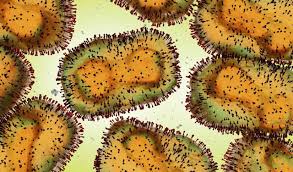Mpox Virus : Study

A study revealed a novel adaptation mechanism of the Mpox virus enhancing its ability to infect humans amidst recent outbreaks.
- The name was changed from “monkeypox” to “mpox” to avoid stigma towards monkeys and reflect the virus’s direct human infectivity.
- Mpox, also known as monkeypox, is a DNA virus.
- It belongs to the family Poxviridae, which consists of large, double-stranded DNA viruses.
- The virus was first identified in monkeys in 1958 but has since been found to infect humans as well.
- Mpox is primarily transmitted to humans from animals, particularly rodents and primates, through direct contact or through contaminated objects.
- Mpox infection in humans typically presents with fever, headache, muscle aches, and a characteristic rash that progresses from macules to papules to vesicles and pustules.
- While a vaccine for mpox exists, its availability and effectiveness are limited, highlighting the need for improved prevention and control measures.
- Mpox gained global attention during a widespread outbreak that affected over 100,000 people in more than 118 countries in 2022-2023.
- The outbreak was characterised by high human-to-human transmission, particularly through close contact and the sexual route.
- The World Health Organization (WHO) declared the mpox outbreak a public health emergency, leading to coordinated efforts to control its spread.
- Mpox genomes are divided into clades I and II, with evidence suggesting clade I has higher mortality.
- The 2022 outbreak involved a new lineage, clade IIb, better adapted for human-to-human transmission.
- Researchers found evidence of a distinct lineage of clade I associated with human-to-human transmission, suggesting a recent zoonotic spillover event.
- Mpox viruses can undergo genomic accordion through gene duplication or deletion to adapt to different hosts and environments.




